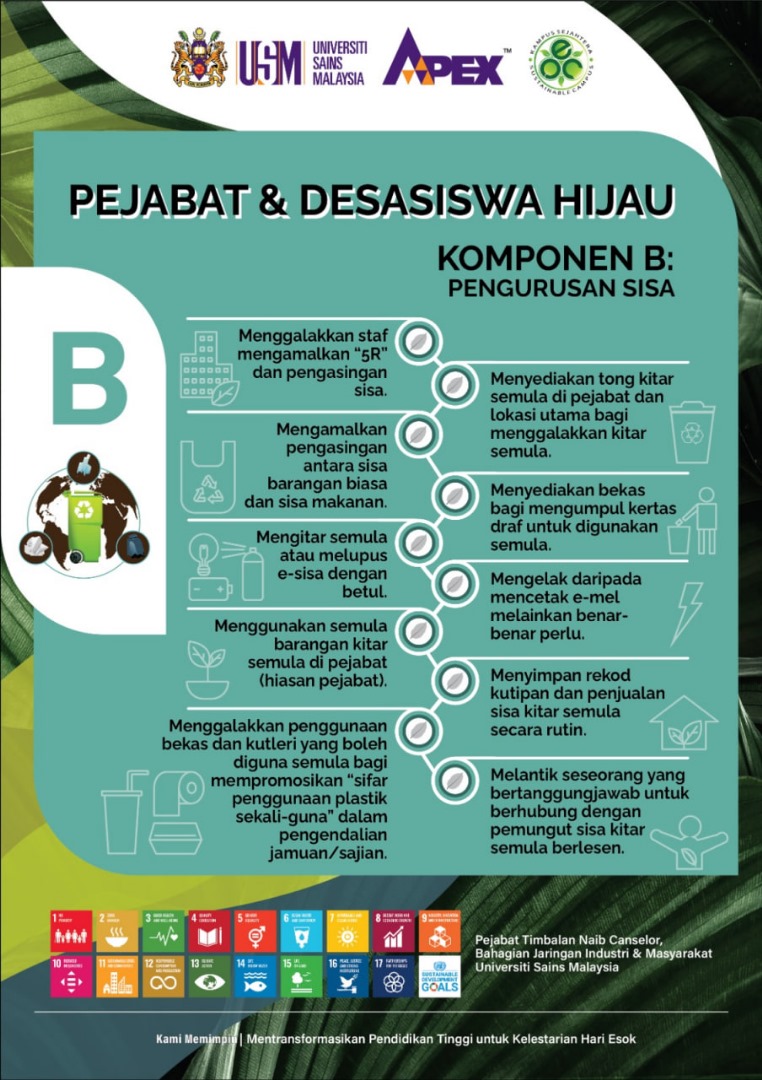Mission & Vision
WE DEDICATE TO CREATE A SUSTAINABLE FUTURE, DRIVING POSITIVE CHANGE, AND INSPIRING A GENERATION OF LEADERS WILL HELP SUSTAIN OUR PLANET
We aim at promoting sustainability among the community within and outside the campus through education and research activities
Client Charter
We are committed to achieving the mission and vision of USM through :
- Empowering students with the values and characteristics that are accepted in local & global markets.
- Empowering students to enhance future leadership talents to build a human capital that is holistic and sensitive to social issues and global changes in the process of nation building.
- Empowering researchers to improve the research & innovation that are recognised and make an impact on society and the survival of a sustainable world.
- Strengthening academic excellence through continuous professional development and keeping abreast with technology.
- Educating and strengthening efforts to realise the sustainability agenda of the University.
- Strengthening University collaborations in various local & global strategic networks.
- Strengthening the governance of the University through the improvement of quality & continuous professional development.
Downloads
Do's and Don'ts
Do's
- Establish Clear Goals: Set specific and measurable sustainability goals aligned with the university's broader sustainability initiatives.
- Educate Staff: Provide training and resources to staff members to raise awareness about sustainability practices and encourage participation.
- Reduce Waste: Implement strategies to reduce waste generation, such as using electronic communication, double-sided printing, and reusable office supplies.
- Conserve Energy: Encourage energy-saving practices like turning off lights and electronics when not in use, using energy-efficient appliances, and optimizing heating and cooling systems.
- Promote Recycling: Place recycling bins throughout the office for paper, plastics, glass, and other recyclable materials. Educate staff on proper recycling procedures.
- Encourage Sustainable Transportation: Provide incentives for staff to use public transportation, carpool, bike, or walk to work. Install bike racks and offer discounts for public transportation passes.
- Support Local and Sustainable Suppliers: Source office supplies, furniture, and equipment from local and sustainable vendors whenever possible.
- Engage in Community Outreach: Partner with community organizations and participate in sustainability events to promote awareness and collaboration.
- Monitor and Evaluate Progress: Regularly track and assess the office's sustainability initiatives to identify areas for improvement and celebrate successes.
- Lead by Example: Demonstrate leadership in sustainability by incorporating eco-friendly practices into office operations and encouraging others to follow suit.
Don'ts
- Ignore Sustainability: Neglecting sustainability efforts can lead to wasted resources, increased costs, and negative environmental impacts.
- Overlook Energy Efficiency: Failing to address energy consumption can result in unnecessary expenses and contribute to greenhouse gas emissions.
- Disregard Recycling Guidelines: Improper disposal of recyclables can contaminate waste streams and undermine recycling efforts.
- Neglect Staff Engagement: Lack of staff involvement can hinder the success of sustainability initiatives and limit their long-term effectiveness.
- Underestimate the Importance of Education: Without proper education and training, staff may not fully understand the importance of sustainability or how to implement sustainable practices.
- Rely Solely on Technology: While technology can aid in sustainability efforts, it's essential to complement it with behavior changes and best practices.
- Forget About the Community: Collaboration with the local community is crucial for broader sustainability impact and fostering positive relationships.
- Prioritize Cost over Sustainability: While cost considerations are important, prioritizing short-term savings over long-term sustainability can be detrimental in the long run.
- Overlook Small Changes: Even small changes can make a significant difference in sustainability efforts. Don't dismiss minor adjustments as insignificant.
- Lose Momentum: Sustainability is an ongoing process. Avoid complacency and continue to innovate and improve sustainability practices over time.

Komponen B: Pengurusan Sisa
